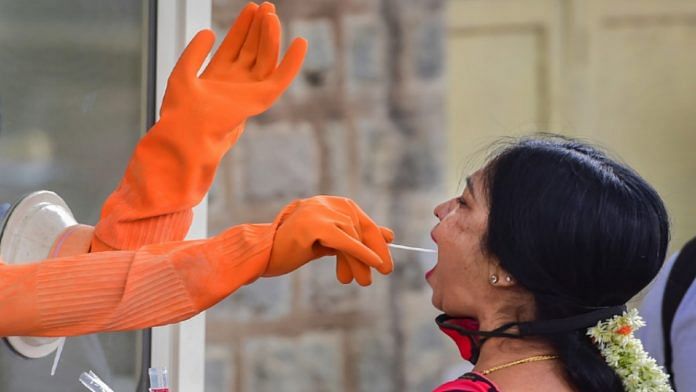New Delhi: The National Centre for Biological Sciences, a Bengaluru-based research organisation, has come out with a Covid-19 test that does not require a PCR (polymerase chain reaction) machine and can be altered to detect mutant strains of the virus.
The test, developed in collaboration with research body Institute for Stem Cell Science & Regenerative Medicine (DBT-inStem), is called PHANTOM and does not rely on DNA amplification, which is required in an RT-PCR test and produces results with similar accuracy.
“It’s a two-step process. In the first step, the sample is put in a tube containing a cocktail of enzymes and a primer in a heat block, which amplifies the RNA present in the sample. The second step is shifting the tube to another heat block and adding an RNA toehold switch, which will prompt a change in colour if the sample is positive,” Dr Arati Ramesh faculty researcher at the NCBS, told ThePrint.
The test was developed by Ramesh and Dr Akash Gulyani, a professor at the University of Hyderabad.
A toehold switch is a biosensor that can be designed to bind to any part of an RNA strand of choice. Once bound, the switch produces a protein that can generate colour or light visible to the naked eye — indicating a positive sample.
“The test in its current form is designed to change colour if it’s a positive sample regardless of the strain. But the sensor can be easily altered to bind to specific parts of the RNA that have undergone mutation, which could then be used to identify different strains,” Ramesh added.
Currently, genome-sequencing is the only method being used to identify different strains of the virus in India, which requires scientists to compare the DNA from a sample with that of the mutant strain.
A paper on the test, not peer-reviewed, was published on the pre-print site medRxiv on 8 January.
Also read: UGC seeks support from universities, colleges to spread info on Covid vaccine rollout
How the test works
In the PHANTOM test, the viral RNA is amplified to detectable levels when it is heated at a steady temperature with three enzymes and a primer pair — short, single-stranded DNA sequences. The primer binds to the RNA, and the enzymes work to produce DNA, which is then converted back to RNA and multiplied.
The second step involves adding the toehold switch, which will produce colour if the virus is present in the sample.
“It’s a fragment of the SARS-CoV-2 genome that is amplified, not the whole thing. This test is more accessible because a single temperature is easier to obtain than the varying temperatures required for a PCR test,” Dr Ramesh said, adding that the whole process will take about two and a half hours.
So far, only naso-pharyngeal swabs have been used for the test, but the lab is hopeful that it will work with saliva as well, and is currently conducting experiments with Baptist Hospital in Bengaluru.
“We have applied for a provisional patent and have sent out the paper for publication. We’re also looking for companies to take this up on a large scale, so it can become a viable assay,” Dr Satyajit Mayor, director of NCBS, told ThePrint.
“What we’ve learned through this pandemic is that you need a variety of tests because no one test can do everything or answer all questions. We hope this one will answer a few,” said Dr Ramesh.
Also read: India’s Covid vaccine drive in numbers: 66 cr doses, 2 lakh vaccinators, 70 walk-in freezers



